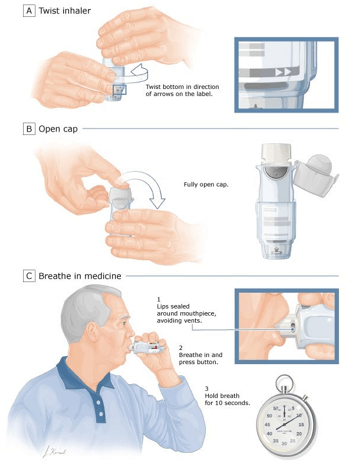A nurse in an acute care setting is preparing to administer medications to a client. Which of the following information should the nurse obtain to identify the client?
Room number of the client
Client's telephone number
Client's full medical diagnosis
Name of the client
The Correct Answer is D
A. Room number of the client:
- The room number alone is not sufficient for accurate client identification. Room numbers may change, and multiple clients may share the same room. Relying on the room number alone can lead to errors.
B. Client's telephone number:
- The client's telephone number is not typically used as a primary identifier for medication administration. It may be part of the client's record, but it is not the primary means of confirming identity before administering medications.
C. Client's full medical diagnosis:
- While the client's medical diagnosis is important for understanding their overall health condition, it is not a primary identifier for medication administration. Diagnoses can be complex and may not be unique to a single individual within a healthcare setting.
D. Name of the client:
- Matching the client's name with their identification band or other official records is a crucial step in preventing medication errors and ensuring the right medication is given to the right person.
Nursing Test Bank
Naxlex Comprehensive Predictor Exams
Related Questions
Correct Answer is C
Explanation
Leukorrhea refers to the increased vaginal discharge that is common during pregnancy. It is usually thin, white, or milky in appearance and is caused by hormonal changes and increased blood flow to the vaginal area. Informing the client about this normal pregnancy symptom can help alleviate concerns and promote reassurance.
Facial swelling, especially during the first trimester, is not a common discomfort experienced in early pregnancy. It can be a symptom of other underlying medical conditions, such as preeclampsia, which should be evaluated by a healthcare provider.
While gastrointestinal changes and bowel irregularities can occur during pregnancy, including constipation, diarrhea is not typically associated with the first trimester. Persistent or severe diarrhea should be assessed by a healthcare provider as it can indicate an underlying issue or infection.
Burning or discomfort during urination is not a typical discomfort of the first trimester. It is more commonly associated with urinary tract infections (UTIs) or other urinary issues. If a client experiences these symptoms, they should be evaluated by a healthcare provider for appropriate diagnosis and treatment.
Correct Answer is C
Explanation
Albuterol is a bronchodilator medication that is commonly delivered through a metered-dose inhaler (MDI) to treat asthma and other respiratory conditions. Proper inhaler technique is crucial for effective delivery of the medication to the lungs.
Option (a) is incorrect because the client should actually tilt their head back slightly and breathe out fully before inhaling the medication.
Option (b) is incorrect because the client should take a slow, deep breath in while depressing the canister once.
Option (d) is incorrect because the client should hold their breath for 10 seconds after inhaling the medication to allow it to reach the lungs.
Therefore, the correct instruction for the nurse to include in the teaching is to instruct the client to close their mouth around the mouthpiece of the inhaler to ensure that the medication is delivered directly to the lungs.

Whether you are a student looking to ace your exams or a practicing nurse seeking to enhance your expertise , our nursing education contents will empower you with the confidence and competence to make a difference in the lives of patients and become a respected leader in the healthcare field.
Visit Naxlex, invest in your future and unlock endless possibilities with our unparalleled nursing education contents today
Report Wrong Answer on the Current Question
Do you disagree with the answer? If yes, what is your expected answer? Explain.
Kindly be descriptive with the issue you are facing.
